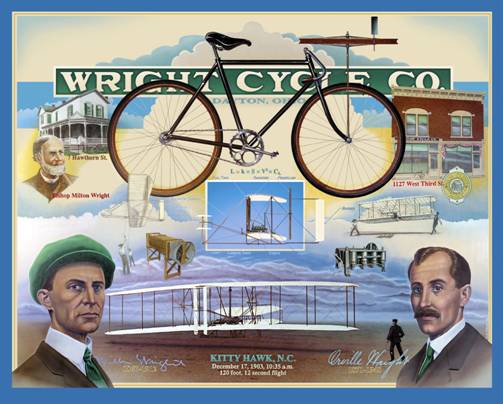Flight (2002)
The Story of Wilbur and Orville Wright
Text by Sukey Smith inspired by the letters and journals of the Wright Brothers
Duration: 20 minutes
Female Narrator; 3(pic).2(ca).2(Ebcl).2(cbn)/4.3Ctpt.3.1/timp.3perc/pf.hp/str
Recorded sounds of airplane engines (CD provided with rental materials)
Commissioned by the Dayton Philharmonic Orchestra
Premiere Performance: April 25, 2003; Dayton Philharmonic Orchestra;
Neal Gittleman, Conductor
Recording: A Celebration of Flight, Albany Records, TROY 672
Dayton Philharmonic Orchestra; Neal Gittleman, Conductor;
Allison Janney, Narrator
An inspiring commemoration of the centennial (1903-2003) of powered flight. A female narrator portrays the Wright Brothers’ younger sister, Katharine, in period costume. The orchestra dramatically underscores her recounting of her brothers’ childhood dreams of flight, their early experiments, her fears for their safety and the eventual triumph of the two American heroes. Real airplane zooms join the orchestra in the exciting finale: a natural for the Fourth of July or other patriotic celebrations.

Program Note:
Flight: The Story of Wilbur and Orville Wright (2002) was commissioned by the Dayton Philharmonic, Neal Gittleman, Music Director, in honor of the 2003 centennial of the Wright Brothers’ first flight. The work was completed in July, 2002 at the American Academy in Rome. The premiere performances were on April 25 and 26, 2003. The 23-minute work is scored for female narrator and orchestra (2 flutes, piccolo, oboe, English horn, 2 clarinets in B-flat, 2 bassoons [II = contra bassoon ], 4 horns, 3 trumpets in C, 3 trombones, tuba, timpani, 3 percussion, piano, harp and strings, and the recorded sounds of airplane engines) plus an optional slide presentation.
The text, by Sukey Smith, was inspired by the Wright Brothers’ letters and journals. The narrator portrays the Wright Brothers’ younger sister, Katharine Wright. She recounts her brothers’ childhood dreams of flight, their early experiments, her fears for their safety and their eventual triumph. The musical themes are built on the interaction of two rising scales: an eight-note scale of alternating half-steps and whole steps and the traditional seven-note major scale. There are three brief musical quotations: the hymn, “Rise up, O Men of God,” as the text mentions “Sundays... our day of church and family,” a fragment from Paul Dukas’ L’Apprenti Sorcier (The Sorcerer’s Apprentice), at the mention of “magic” and the “Avarice” theme from Rodríguez’ own ballet, The Seven Deadly Sins, at the mention of “other inventors... hungry for fame and fortune.”